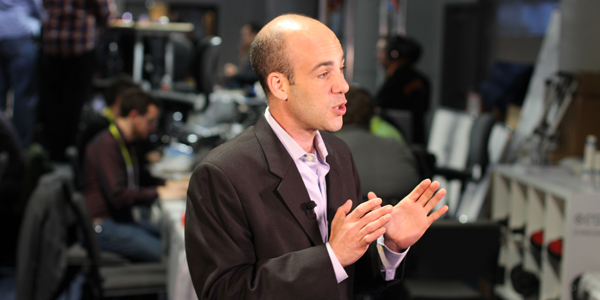
Before the era of iPhones and Androids there was BlackBerry, a smartphone maker that controlled 20% of the market, and the virtually unchallenged leader in mobile business communications. So popular was the BlackBerry phone with an integrated mechanical keyboard that is was called “CrackBerry”, an indicator of just how quickly Americans became addicted to the device.
Get the infographic!
But now, the days when corporate offices were filled with Blackberry devices are a distant memory. Today, the Canada-based smartphone producer barely registers a blip on the global market radar. While many experts cite the tech company being slow to adapt to a changing market and the arrival of the iPhone as the beginning of the end of the once-dominant smartphone maker, the fact is something else also played a key role in BlackBerry's near demise: the failure of the company's CRM (Customer Relationship Management) System.
BlackBerry's troubles started with a sequence of unpredictable events in April 2007, set off by the installation of a buggy software update that left five million American users of its hand-held devices without wireless e-mail service for more than 10 hours, resulting in a backlog of messages. After the end of the ten-hour ordeal its users, as well as partner carriers and the media, were left in the dark for days about what went wrong — violating one of the cardinal sins of modern business: a lack of communication with customers during a crisis. The only saving grace was that the outage happened overnight instead of during office hours, reducing its negative impact on business which allowed BlackBerry to avoid significant customer backlash.
Even so, the company could ill-afford another major communications breakdown. But history would repeat itself, with far different results. In October 2011, technical glitches caused a BlackBerry service blackout for the better part of a week that stretched across Asia, Europe, Latin America, the Middle East and Africa, having a ripple effect that even affected pockets of North America. During the outage — its largest and longest ever — the company failed to use CRM to deliver clear messages about the nature of the problem and what they were doing to address it. Making matters worse, after days of silence as the company scrambled to repair its crippled service, when the top brass finally did hold a news conference to apologize for the disruption and explain its cause they deflected questions about compensating users for the loss of a service that was essential to their businesses, with BlackBerry co-chief executive Jim Balsillie saying that the issue "has not been our priority."

It wasn’t until three days after service problems were resolved that BlackBerry started engaging customers on Facebook, with less than adequate outreach. Unhappy customers fled in droves. The smartphone maker never regained the trust of the corporate tech czars. It’s parent company's stock nosedived 70% over the next 12 months. And the blunder allowed Apple and Android-based smartphone producers to muscle in on what was once BlackBerry market share.
Things happen, crisis occur, however it is how the crisis is handled that makes the difference!
Fast, open, honest and transparent communication is vital. BlackBerry's poor response broke the customer-communication connection, which is deeply linked to loyalty and long-term growth.
The company's failure serves as a cautionary tale of what can happen without a strong communications strategy and social media-based crisis management plan.
In an age when customer-centricity has become the winning strategy, it's imperative that an open and honest communication plan is at the top of your priority list. Here are a few messages that are vital to any social crisis response:
- An explanation of what went wrong and genuine concern for the impact that the situation has on customers, employees, the general public and other involved parties.
- A sincere apology to convey that you take full responsibility for any mistakes you’ve made (even if you didn’t make any).
- Expression of a commitment to identifying the root cause of the problem and addressing it so that it doesn’t happen again.
- Transparency, since holding back information can not only erode trust but make matters worse (never stonewall or deflect questions, since being defensive appears like you have something to hide).
- Never argue, since it shows an inability to take your lumps and will cause you to lose credibility.

In today’s world, the best way to communicate with large swathes of your audience all it once is often through social media. So if you have a crisis on your hands, follow these steps:
- Listen Carefully. Track keywords and hashtags to monitor what people are saying about your brand on social platforms. This way you can identify and engage with your supporters and critics
during the crisis. - Designate a Response Point Person. Task a single knowledgeable person to be your social media voice. Having a well-informed digital spokesperson will shows a unified front and eliminate mixed messages.
- Get in Crisis Mode. Set up a response page on your website and use your social media channels to direct customers and the media there. Update your page continuously with credible information to keep people in the loop.
Depending on the nature and extent of the crisis at hand, you'll need to adjust your communications response accordingly, so proper planning is a must. Poor communication and social media response can add fuel to the fire, but a well-thought-out strategy can douse the flames, help you to preserve or repair your reputation and allow you to live to business another day.
-
Need help effectively communicating with customers? Dotlogics has experience with social media and digital marketing communications of all types. CLICK HERE to connect with an experienced customer service manager and see how to avoid a crisis!
Let's Get to Work.
Have an unsolvable problem or audacious idea?
